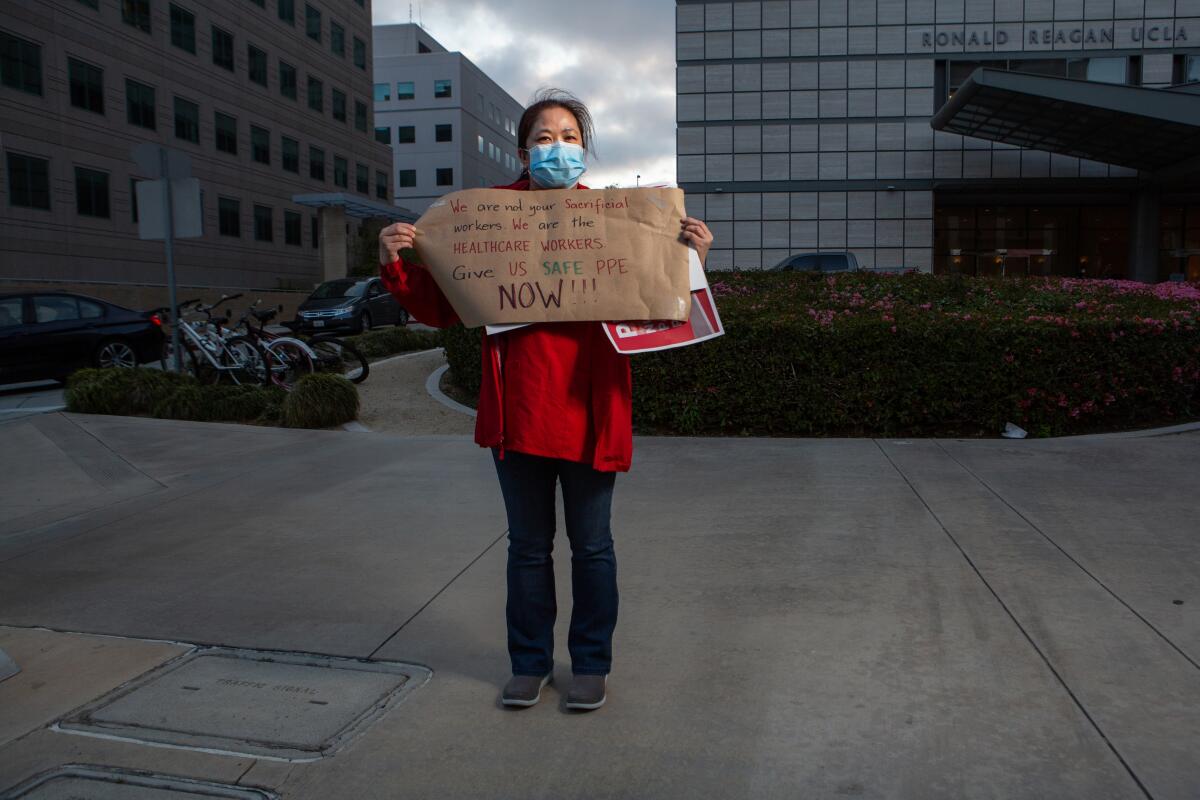Newsletter: Let’s get through the coronavirus era together. Here are some tools

- Share via
Good morning. I’m Rachel Schnalzer, the L.A. Times Business section’s audience engagement editor.
We know that many readers are struggling with financial and work issues caused by the coronavirus crisis. So we’re turning our business newsletter, previously helmed by columnist David Lazarus, into a one-stop shop for insights on how you and your bank account can weather the pandemic and prepare for whatever the economy might look like on the other side of this. Starting next week, we’ll be in your inbox every Tuesday morning, with the goal of making this difficult time as bearable as possible.
Whether you’re dealing with debt, reduced hours or a layoff, or you need fresh ideas about how to make working from home work better for you, we plan to address your interests — so please let us know how we can help. We’re starting this week by highlighting some of our recent coverage and answering a reader question.
Worried about getting the coronavirus at work?
While many people are working from home amid the COVID-19 pandemic, millions of Californians with jobs deemed essential still head to their workplaces each day. Are you concerned that your employer isn’t keeping you adequately protected? Samantha Masunaga and Thuc Nhi Nguyen looked into what you can do.
There’s no sugarcoating it: Workers who fear they’re being exposed to the virus on the job are in a tough position. The state agency that enforces workplace safety — California’s Division of Occupational Safety and Health, known as Cal/OSHA — is receiving a large volume of COVID-19 workplace complaints, and even labor advocates suggest employees think carefully before refusing a boss’ order to perform hazardous work.
“Employers can retaliate, and that retaliation may be illegal, but its consequences will likely be very immediate,” said Stephen Knight, executive director of Worksafe, a worker advocacy group. “Any redress will take much longer to pursue with the system.”
But it’s still critical to keep filing complaints, says Alice Berliner, coordinator for the Southern California Coalition for Occupational Safety and Health. “It’s really important that the state and Cal/OSHA know that COVID cases are still happening in workplaces, that workers are still being put at risk.” You can also file a report with your county’s department of public health. And you can try reaching out to media organizations if there has been a large number of coronavirus cases in your workplace. (The Times is always looking for news tips.)
When bringing up concerns about coronavirus exposure, labor advocates advise, workers should approach their employer as a group — showing that the issue is a collective problem — rather than one by one. Unionized workers can turn to their union representatives, and workers who are not represented by a union may find it helpful to reach out to worker centers or community advocacy groups. A few examples: the Garment Worker Center, the Warehouse Worker Resource Center, the Los Angeles Black Worker Center and the Koreatown Immigrant Workers Alliance.
Consider subscribing to The Times
Your support helps us deliver the news that matters most. Become a subscriber.
Other stories you may find helpful
— Homeowners are turning to their mortgage lenders for help. Forbearance programs let borrowers delay payments or make partial payments for a while — and personal finance columnist Liz Weston suggests it as a top option for those struggling to make ends meet right now — but the process can be confusing. Andrew Khouri explains what you need to know.
— Are you searching for a job? You may want to hear from a few people who are in the same shoes. Ronald D. White spoke with four job seekers about their experiences hunting during the pandemic. These are their stories.
— Are you waiting to receive your stimulus payment in the mail? Checks are expected to go out to those earning less than $20,000, followed by income increases of $10,000 each week, beginning May 1. For more information, read this breakdown by Lila Seidman.
— Getting a “payment status not available” error on the IRS site when you try to learn the status of your stimulus check? Jessica Roy tested out a tip she heard from a friend: Enter your street address in all caps. It worked for her, as well as plenty of others. Hopefully it works for you, too.
— Thousands of sports games, concerts and other events are being postponed or canceled. Many ticket holders are now wondering whether they will be able to get refunds. Jack Harris breaks down your options.
The coronavirus news that matters most
For the latest on the pandemic, sign up for our Coronavirus Today newsletter, sent weekday evenings, and check out our frequently updated news roundup.
Reader question
A reader asks us: If I filled out my unemployment claim wrong, can I edit it or refile it?
Emmanuel Morgan got in touch with California’s Employment Development Department to track down the answer to this question. If you need to change information on an unemployment claim, you’ll need to contact the EDD, and the department said the most direct way to do that is using the “contact” feature on its UI Online tool.
However, the swell of layoffs and furloughs in the last month means the EDD is receiving a high volume of calls and processing unusually large numbers of claims, so getting immediate attention from a representative may be difficult. It is possible to update your address or phone number through UI Online without having to speak with a representative.
Unsure how to apply for unemployment? Take a look at Nicole Santa Cruz’s explainer.
One more thing
A tip for anyone working from home with a partner or roommates: If you’re having trouble leading a conference call because your significant other has a meeting at the same time, consider starting a shared calendar that includes scheduled meetings for everyone in the household. Quarters might be cramped and voices might be loud, but knowing when others will be speaking can go a long way toward keeping everyone calm.
Have a question about work or finances during the COVID-19 pandemic, or tips for coping that you’d like to share? Send us an email at californiainc@latimes.com, and we may include it in a future newsletter.
Until next week!
Inside the business of entertainment
The Wide Shot brings you news, analysis and insights on everything from streaming wars to production — and what it all means for the future.
You may occasionally receive promotional content from the Los Angeles Times.





